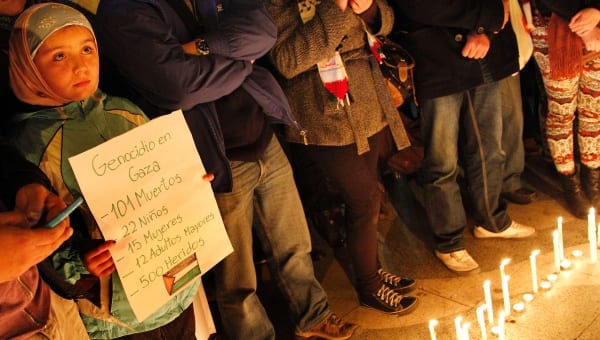A dispatch from Telesur
ORIGINALLY PUBLISHED ON JULY 30, 2014

A member of the Palestinian community in Chile holds up a sign during a rally against Israel's offensive in Gaza (Reuters photo)
 The Chilean Ambassador is recalled from Tel Aviv in response to the increasing suffering of the Gazan people under Israeli attacks.
The Chilean Ambassador is recalled from Tel Aviv in response to the increasing suffering of the Gazan people under Israeli attacks.
In response to the escalation of Israeli attacks on Gaza, the Chilean government recalled their ambassador, Jorge Montado, from Tel Aviv.
In a statement released by the Foreign Ministry, it expresses great concern for the suffering of the Palestinian people in the past weeks. “Chile notes with great concern and dismay that the military operations, which have become a collective punishment against the Palestinian population in Gaza, do not respect fundamental rules of international humanitarian law, as evidenced by the more than a 1,000 civilian casualties, including women and children, as well as attacks on schools and hospitals.”
“Chile supports the call by the Secretary-General of United Nations, Mr. Ban Ki-moon, who has stated that 10% of Gaza's population has sought U.N. refuge. The U.N. has called on Israel and all parties to do more to ensure the safety of U.N. sites and the people who have sought refuge there.”
Last week the Chilean Foreign Ministry announced aid for Palestinian victims of Israeli aggression, pledging $150,000 aid for the United Nations Relief and Works Agency for Palestine Refugees in the Near East (UNRWA).
It is estimated that Chile has the largest population of Palestinians outside of the Middle East.
HISTORICAL FOOTNOTE (Wikipedia)
The Palestinian community in Chile is believed to be the largest Palestinian community outside of the Arab world.[3]Estimates of the number of Palestinian descendants in Chile range from 450,000 to 500,000.[4][5][6] The effects of their migration are widely visible.[2]
Migration history
The earliest Palestinian migrants came in the 1850s during the Crimean War; they worked as businessmen and also in agriculture. Other migrants arrived during World War I and later the 1948 Palestine war.[2] By origin they primarily came from the cities of Beit Jala, Bethlehem, and Beit Sahour.[7] Most of these early migrants were Christians. They typically landed at Argentine ports, and crossed the Andes by mule into Chile.[8] Chilean Palestinians are often erroneously but also intentionally called turcos (Spanish for Turks) after the Ottoman nationality that early immigrants had on their passports. Contrary to the immigration of Germans and other European nationalities, the immigration of Palestinians was not considered beneficial by Chilean intellectuals, and was even, alongside Chinese and Japanese immigration, questioned.[9] The arrival of the Palestinian immigrants to Chile in the early 20th century happened at the same time the Chilean state stopped sponsoring immigration to Chile and the country suffered a severe social and economic crisis coupled with a wave of nationalism with xenophobic and racist undertones.[9] Palestinians were also at times treated in denigrating terms by the Chilean press; for example, El Mercurio (the nation's leading establishment and voice of the country's upper class who has a long history of social exclusionism and classism) wrote in 1911:[9]
| “ | Whether they are Mahometans or Buddhists, what one can see and smell from far, is that they are more dirty than the dogs of Constantinople... | ” |
Many of the immigrants were very poor and illiterate and had to take loans to pay their travel costs.[9] Once in Chile Palestinians settled largely in the marginal areas of cities and worked as small merchants.[9] In the 1950s by the time of the second government of Carlos Ibáñez del Campo many Palestinian-Chileans had acquired substantial economic as well as political power in Chile, some working as deputies, ministers or ambassadors.[9]
Aside from these migrants of previous decades, Chile has also taken in some Palestinian refugees in later years, as in April 2008 when it received 117 from the Al-Waleed refugee camp on the Syria–Iraq border near the Al-Tanf crossing.[10] All of those refugees were Sunni Muslims.[9]
Since the 1940s the Palestinian community has given rise to some of Chile's biggest fortunes, with the Sumar, Hirmas and Yarur clans controlling the leading textile firms in the country and latin America.
It must be noted that the Palestinian community in Chile, like its counterpart in the United States, has not been notable for its support of the Palestinian struggle, preferring instead to remain on the margins of the international debate.
Read it in your language • Lealo en su idioma • Lisez-le dans votre langue • Lies es in Deiner Sprache • Прочитайте это на вашем языке • 用你的语言阅读
[google-translator]

THIS WORK IS LICENSED UNDER A Creative Commons Attribution-NonCommercial 4.0 International License




